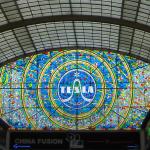On All Saints’ Sunday the church recognizes the strong spiritual bond between those who have died and now rest with G-d, and those of us, the living, who remember them. We remember them as saints not because they were perfect, but because in the Spirit we saw Christ in them, just as we see Christ and the face of G-d in our neighbor.
We have many promises in Scripture that nothing can ultimately separate us from those who have died. Romans 8: “And I am convinced that nothing can ever separate us from God’s love. Neither death nor life, neither angels nor demons, neither our fears for today nor our worries about tomorrow—not even the powers of hell can separate us from God’s love. 39 No power in the sky above or in the earth below—indeed, nothing in all creation will ever be able to separate us from the love of God that is revealed in Christ Jesus our Lord.”
On this All Saints 2021, we are especially mindful of the 753,000 who have died from Covid-19 in the United States, and the 5 million globally. So we mourn not only our losses of family and friends, but we mourn with a world that grieves the loss experienced during this pandemic.
And this week, as world leaders gather for the UN Climate Summit, we are also reminded we have entered a planetary era in which humans now make more of an impact on planetary life than any other cause. And not just an impact on life, but on the planet itself, the Anthropocene understood as a geological era dating from the start of major human impact on Earth’s geology and ecosystems, including climate change.
The number here is 1.5 degrees celsius. We are trying, and failing, to commit with real action to not raising the planetary temperature more than 1.5 degrees Celsius.
All of this having me pondering All Saints’ Sunday as not simply an anthropocentric day to highlight our human connection to other humans who have died, but also our connection to creation itself, and in particular those parts of creation we have lost who now also rest with G-d. Extinct species. Wrecked habitats. Ozone. Lost islands.
All of this is to say, might we consider creation itself as part of the communion of Saints. Clearly, Paul imagines creation itself somehow related to G-d’s overcoming of death in Christ. And if we believe Christ existed as a real human body and was raised from the dead in the body, this means those parts of his body that were raised are now also in G-d—from the water in his cells to the heavy metals in his bones, heavy-metals that were themselves originated in the heart of exploding stars.
Nothing in all of creation will ever be able to separate us from the love of God that is revealed in Christ Jesus.












